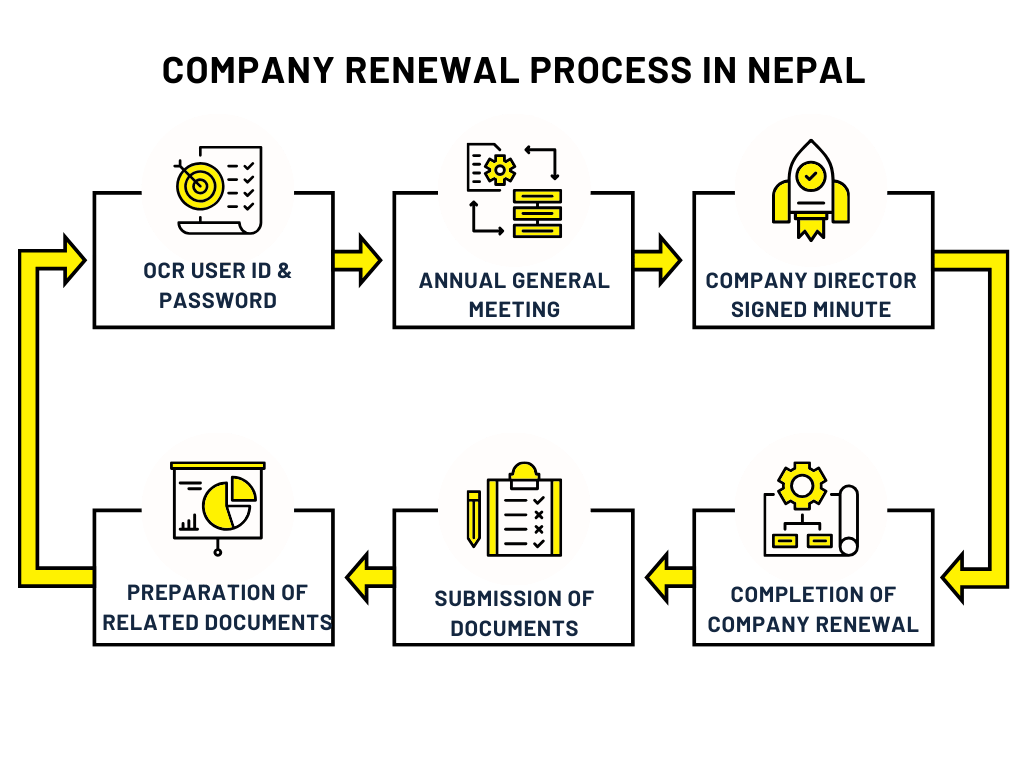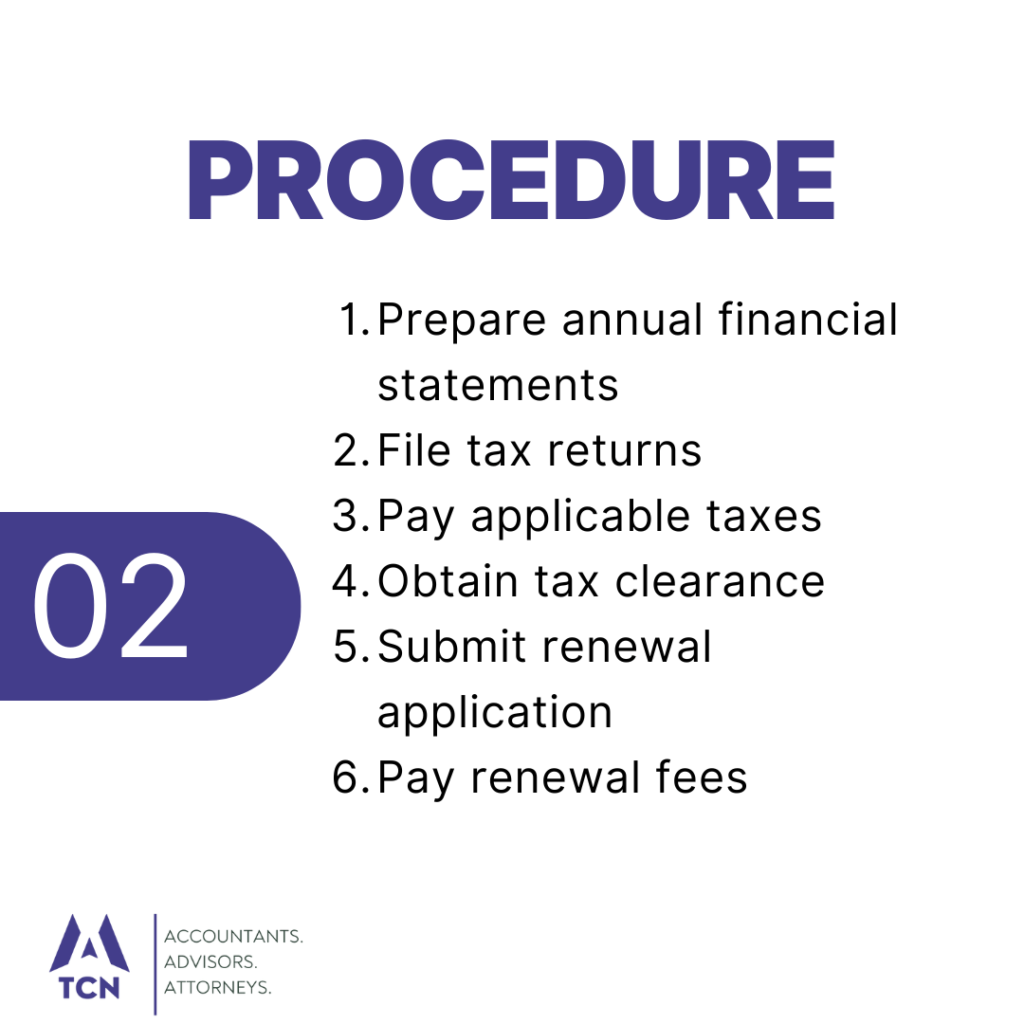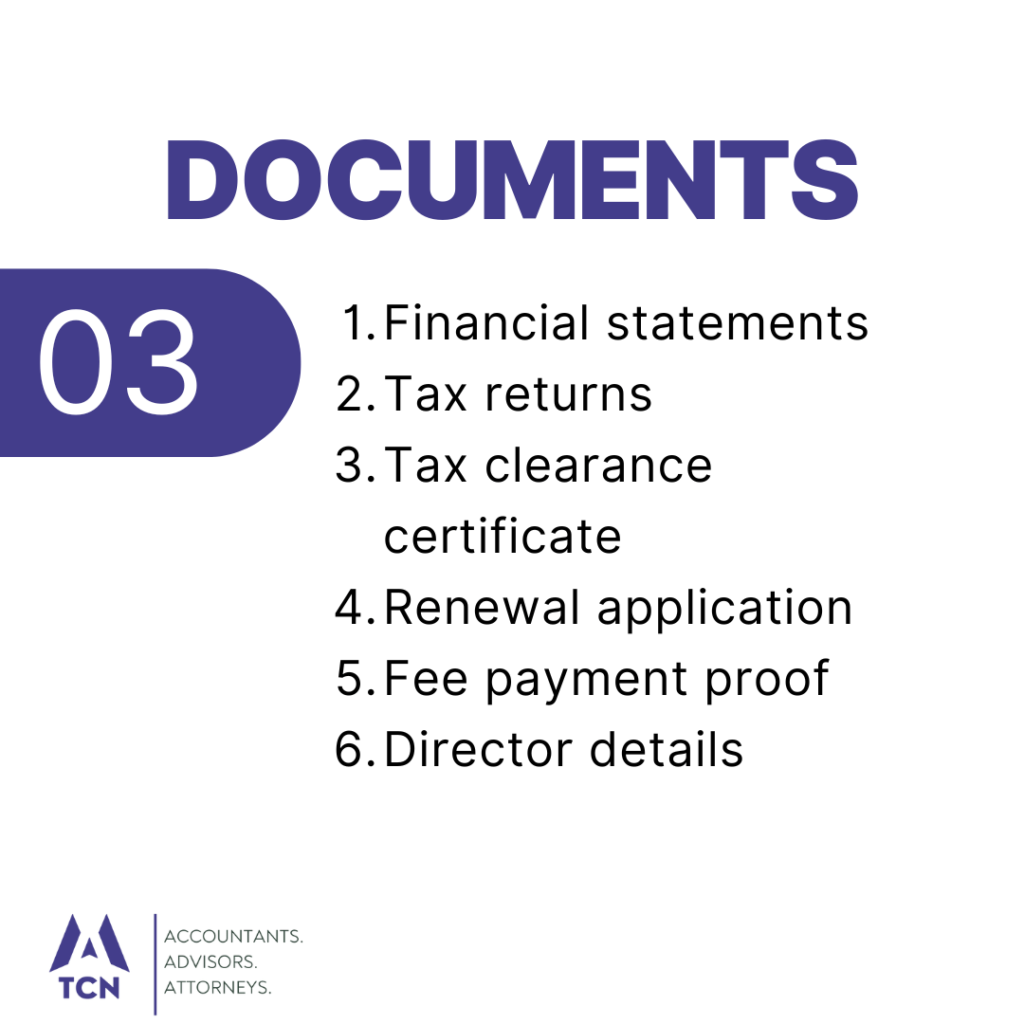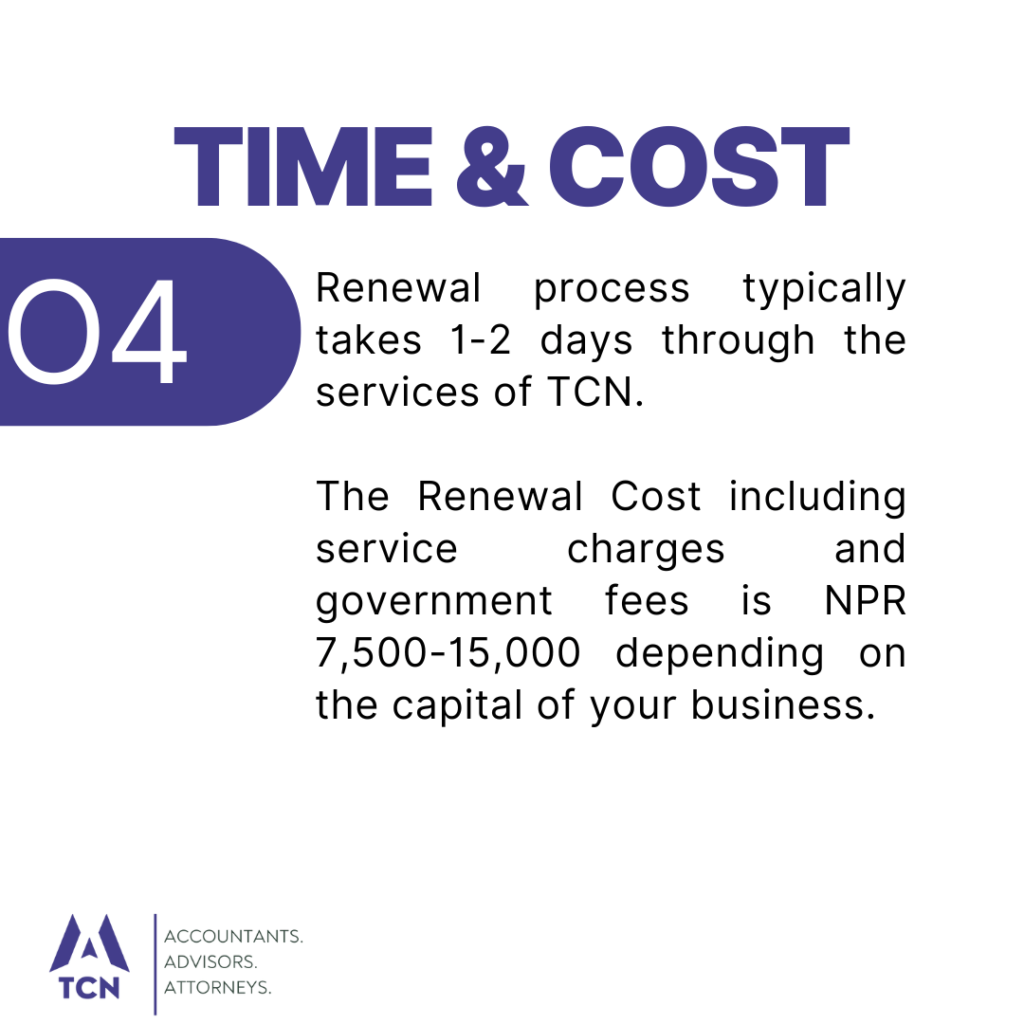Are you a business owner in Nepal wondering about the ins and outs of company renewal? You’re in the right place! Keeping your company’s registration up-to-date is crucial for maintaining its legal status and avoiding penalties. In this guide, we’ll walk you through everything you need to know about renewing your company in Nepal. Let’s dive in!
How to Renew Your Company in Nepal?
- Step 1: Provide OCR User ID and Password
- Step 2: Conduct Annual General Meeting
- Step 3: Company Director Signed Minute
- Step 4: Preparation of Related Documents
- Step 5: Submission of Documents
- Step 6: Completion of Company Renewal

When should a company be renewed?
Have you ever wondered why your calendar seems to have an extra “New Year” marked on it? Well, for companies in Nepal, there’s a special date that’s just as important as January 1st – their renewal date!
In Nepal, companies must be renewed annually. But when exactly should you start thinking about renewal? Here’s what you need to know:
- Annual Requirement: Every company registered in Nepal must renew its registration once a year. It’s like an annual check-up for your business!
- Fiscal Year Basis: The renewal is typically based on the Nepali fiscal year, which runs from mid-July to mid-July.
- Renewal Window: You have a three-month window after the end of the fiscal year to renew your company. This means you should aim to complete your renewal between mid-July and mid-October.
- Early Bird Gets the Worm: While you have three months, it’s always better to start the process early. This gives you ample time to gather all necessary documents and avoid any last-minute rush.
- Mark Your Calendar: As soon as you register your company, make a note of your renewal date. Set reminders if needed – your future self will thank you!
- Financial Statements: Your company’s financial statements should be prepared before renewal. These typically cover the previous fiscal year.
- AGM Consideration: Many companies hold their Annual General Meeting (AGM) before renewal, as decisions made in the AGM might be relevant to the renewal process.
Remember, renewing your company isn’t just a legal formality – it’s an opportunity to review your business’s progress over the past year and set the stage for future growth. Think of it as your company’s birthday – a time to celebrate its existence and plan for the year ahead!
What documents are needed for company renewal?
Getting ready to renew your company in Nepal? Great! But before you head to the Office of Company Registrar (OCR), let’s make sure you have all your ducks in a row. Gathering the right documents is crucial for a smooth renewal process. Here’s what you’ll need:
- Renewal Application Form: This is the star of the show. You can obtain this form from the OCR or download it from their official website. Fill it out accurately and completely.
- Tax Clearance Certificate: This document proves you’re up to date with your tax obligations. You’ll need to get this from the Inland Revenue Department.
- Audited Financial Statements: These should cover the last fiscal year. Make sure they’re prepared by a registered auditor.
- Annual Report: This provides an overview of your company’s activities and financial performance over the past year.
- Minutes of the Annual General Meeting (AGM): This document should detail the decisions made at your last AGM, including the approval of financial statements and appointment of auditors.
- Proof of Tax Submission: Include evidence that you’ve submitted your tax returns for the previous fiscal year.
- Company PAN Card: Keep a copy of your Permanent Account Number card handy.
- Citizenship Certificates: Copies of citizenship certificates for all company directors.
- Recommendation Letter: If your company falls under any regulatory body (like the Nepal Rastra Bank for financial institutions), you might need a recommendation letter from them.
- Previous Year’s Registration Certificate: This serves as proof of your last renewal.
- Declaration of Compliance: A statement confirming that your company has complied with all legal requirements over the past year.
- Authorized Letter: If someone other than the company director is submitting the renewal application, they’ll need an authorization letter.
Pro tip: Create a “Renewal Folder” at the start of each fiscal year. As you generate or receive these documents throughout the year, add them to this folder. When renewal time comes around, you’ll have everything at your fingertips!
Remember, the exact list of required documents can vary depending on your company’s nature and size. It’s always a good idea to check with the OCR or a legal advisor to ensure you have everything you need. Being well-prepared not only speeds up the renewal process but also demonstrates your company’s commitment to compliance and good governance. So, gather those documents and get ready to give your company its annual refresh!
What are the documents required for company renewal in Nepal?
The company renewal Nepal process requires comprehensive documentation that varies by company type:
- Tax Clearance Certificate: Latest certificate or proof of tax submission with the Inland Revenue Department
- Financial Statements: Audited balance sheet, profit and loss account, and cash flow statement for the previous fiscal year
- Board Resolution: Formal approval of annual financial statements and renewal application
- Shareholder Details: Updated list of all shareholders with shareholding patterns
- Directors’ Information: Details of current directors, including any changes during the year
- Company Registration Certificate: Original certificate of incorporation
Where to submit company renewal documents?
Now that you’ve gathered all your documents, you’re probably wondering, “Where do I take all this stuff?” Don’t worry, we’ve got you covered! Let’s talk about where you need to go to submit your company renewal documents in Nepal.
The One-Stop Shop: Office of Company Registrar (OCR)
The Office of Company Registrar (OCR) is your go-to place for all things related to company registration and renewal in Nepal. Here’s what you need to know:
- Central Location: The main OCR office is located in Kathmandu. If you’re in the capital, this is where you’ll be heading.
- Branch Offices: Good news for those outside Kathmandu! The OCR has been expanding its reach. There are now branch offices in several major cities across Nepal.
- Physical Submission: As of now, the primary method for submitting renewal documents is in person at an OCR office.
- Counter Service: Once at the OCR, look for the renewal counter. There are usually helpful staff members who can guide you if you’re unsure.
- Verification Process: The OCR officials will review your documents on the spot. If everything is in order, they’ll accept your submission.
- Receipt: Don’t forget to collect your submission receipt. This is your proof that you’ve initiated the renewal process.
- Follow-Up: Sometimes, you might be asked to provide additional information or documents. Keep your contact details updated so the OCR can reach you if needed.
What are the required documents for foreign company renewal in Nepal?
Foreign-invested companies face additional documentation requirements:
- NRB/IBN Approvals: Updated approvals from Nepal Rastra Bank or Investment Board Nepal
- Foreign Investment Details: Statement of foreign investment inflow and repatriation history
- Parent Company Documents: Latest annual report of the parent company
Table: Documentation Requirements by Company Type
| Document Type | Private Limited | Public Limited | Foreign Company Branch | Non-Profit |
|---|---|---|---|---|
| Tax Clearance | Required | Required | Required | Required |
| Audited Financials | Required | Required | Required | Required |
| Board Resolution | Required | Required | Required | Required |
| Shareholder Details | Required | Required | Not Applicable | Not Applicable |
| NRB Approval | Not Applicable | Not Applicable | Required | Not Applicable |
| Parent Company Report | Not Applicable | Not Applicable | Required | Not Applicable |
Document Preparation Challenge? Our team can prepare and verify all required documentation for your renewal. Learn About Our Document Service
What about online submission?
You might be wondering, “Can’t I just do this online?” Well, the Nepali government has been working on digitizing many processes, including company renewals. However, as of now, the online system for company renewals is not fully implemented. But keep an eye out for updates – Nepal is rapidly modernizing its business processes!
Tips for a smooth submission:
- Call Ahead: Before making the trip, call the OCR to confirm their current procedures and timings.
- Organize Your Documents: Arrange your documents in the order they’re typically reviewed. This can speed up the process.
- Make Copies: Keep a copy of everything you submit, just in case.
- Go Early: OCR offices can get busy, especially near renewal deadlines. Going early in the day can save you time.
- Be Patient: Remember, the staff at OCR are there to help. A friendly and patient attitude goes a long way!
Submitting your renewal documents might seem like a chore, but look at it this way – it’s an annual ritual that keeps your business legally sound and ready for another year of success. Plus, it’s a great opportunity to review your company’s progress and plan for the future. So, gather those documents, head to the OCR, and give your company the renewal it deserves!
Relevant Articles:
- Process of Filing for Property Tax in Nepal
- Labor Audit and Compliance in Nepal
- Tax Assessment Appeal in Nepal
How much does company renewal cost?
When it comes to renewing your company in Nepal, one of the burning questions is always about the cost. After all, every business owner wants to budget accurately, right? Let’s break down the costs associated with company renewal in Nepal.
The Basic Renewal Fee
The good news is that the basic renewal fee for companies in Nepal is relatively straightforward. However, it’s important to note that the exact amount can vary based on a few factors:
- Company Type: The renewal fee differs for private limited companies, public limited companies, and non-profit organizations.
- Authorized Capital: Companies with higher authorized capital generally pay higher renewal fees.
- Timely Renewal: Renewing within the designated period (usually within three months after the fiscal year-end) often costs less than late renewals.
As of the last update, the basic renewal fees typically range from NPR 5,000 to NPR 20,000 for most small to medium-sized companies. However, always check with the Office of Company Registrar (OCR) for the most current fee structure, as these can change.
Additional Costs to Consider
While the basic renewal fee is the main expense, there are other costs you might incur during the renewal process:
- Late Fees: If you miss the renewal deadline, you may have to pay additional late fees. These can accumulate over time, so it’s best to renew on time!
- Document Preparation: There might be costs associated with preparing the necessary documents, such as:
- Auditor’s fees for financial statement audits
- Lawyer’s fees if you need legal assistance
- Notary charges for document verification
- Travel Expenses: If you’re not based in the same city as the OCR office, factor in travel costs.
- Photocopying and Printing: Don’t forget about the small costs of preparing multiple copies of documents.
- Bank Charges: Some fees might need to be paid through bank drafts, which can incur small bank charges.
Cost-Saving Tips
While you can’t avoid the renewal fees, here are some ways to keep your costs down:
- Renew on Time: This is the simplest way to avoid late fees and penalties.
- Be Prepared: Having all your documents ready can save you multiple trips to the OCR, reducing travel costs.
- DIY Where Possible: If you’re comfortable with the process, prepare as much as you can yourself instead of hiring external help.
- Digital Copies: Keep digital copies of all your documents. This can reduce printing costs over time.
- Plan Ahead: Budget for your renewal costs throughout the year so it doesn’t hit your cash flow all at once.
Remember, while the cost of renewal might seem like an extra expense, it’s an investment in your company’s legal standing and future operations. Think of it as an annual tune-up that keeps your business running smoothly and legally in Nepal’s business landscape.
Always check with the OCR or a qualified accountant for the most up-to-date fee structure, as these can change with government policies. By staying informed and planning ahead, you can ensure that your company renewal process is not just compliant, but also cost-effective!
Can company renewals be done online?
In this digital age, you might be wondering, “Can’t I just renew my company online from the comfort of my office?” It’s a great question, and the answer is… well, it’s complicated. Let’s dive into the current state of online company renewals in Nepal.
The Current Scenario
As of now, the process of company renewal in Nepal is primarily offline. However, the government has been making strides towards digitization. Here’s what you need to know:
- Partial Online Services: While full online renewal isn’t available yet, some parts of the process have been digitized.
- Document Submission: Currently, physical submission of documents at the Office of Company Registrar (OCR) is still required.
- Information Verification: Some preliminary information can be verified online through the OCR’s website.
- Form Downloads: Many of the necessary forms can be downloaded from the OCR’s official website, saving you a trip to their office.
- Online Payment Systems: Some fees can now be paid online, though this isn’t universally implemented yet.
The Future of Online Renewals
The good news is that Nepal is actively working towards a more digital-friendly business environment. Here’s what’s on the horizon:
- E-Governance Initiatives: The government has been pushing for more e-governance solutions, including in company registrations and renewals.
- Pilot Programs: Some pilot programs for online renewals have been tested in limited capacities.
- Gradual Implementation: Expect to see more online features rolled out gradually over the coming years.
- Integrated Systems: There are plans to integrate various government departments, which could streamline the renewal process.
What This Means for You
While we wait for full online renewal capabilities, here’s how you can make the most of the current system:
- Stay Informed: Keep an eye on the OCR’s official website for updates on online services.
- Prepare Online: Use the available online resources to prepare your documents and forms in advance.
- Digital Records: Maintain digital copies of all your company documents. This will make the transition to online renewals smoother when it happens.
- Feedback: If you have the opportunity, provide feedback to the OCR about online services. User input can be valuable in shaping future systems.
- Be Patient: Remember, the shift to online systems is a complex process. It takes time to ensure security and functionality.
Pro Tips for the Current System
While we await full online renewal capabilities, here are some tips to make the current process smoother:
- Use Email: Many OCR offices now accept queries via email. Use this to get information without making unnecessary trips.
- Check for Updates: Before starting your renewal process, check the OCR website for any new announcements or changes in procedures.
- Prepare Digital Copies: Even if you need to submit physical documents, having digital copies can speed up the process if additional submissions are needed.
- Stay Connected: Follow the OCR’s official social media accounts (if available) for real-time updates on services and procedures.
While we’re not quite at the stage of renewing your company with just a few clicks, Nepal is definitely moving in that direction. The future of company renewals in Nepal is digital – it’s just a matter of time. For now, embrace the digital aspects that are available, stay informed about changes, and look forward to a future where renewing your company might just be as easy as ordering a pizza online!
What happens if renewal deadline is missed?
Oops! Did the renewal deadline slip by without you noticing? Don’t panic – you’re not alone. Many business owners in Nepal have found themselves in this situation. But what exactly happens when you miss the company renewal deadline? Let’s break it down.
The Immediate Consequences
- Late Fees: The most immediate impact is financial. You’ll be subject to late fees, which increase the longer you delay.
- Legal Status: Your company’s legal status becomes uncertain. While it doesn’t mean immediate dissolution, it does put you in a precarious position.
- Operational Challenges: You might face difficulties in conducting normal business operations, like opening bank accounts or bidding for contracts.
- Increased Scrutiny: Late renewal often leads to increased scrutiny from regulatory bodies during your next renewal process.
The Snowball Effect
If left unaddressed, missing the renewal deadline can lead to more serious consequences:
- Accumulating Penalties: The longer you wait, the more penalties accrue. These can quickly become substantial.
- Risk of Deregistration: In extreme cases of prolonged non-renewal, your company risks being struck off the register.
- Legal Complications: You might face legal challenges, especially if you continue to operate without renewal.
- Reputation Damage: Late renewal can affect your company’s reputation, potentially impacting relationships with clients and partners.
Steps to Take if You’ve Missed the Deadline
Don’t worry, all is not lost! Here’s what you should do:
- Act Quickly: The sooner you address the missed deadline, the better. Don’t let it linger!
- Contact the OCR: Reach out to the Office of Company Registrar immediately. They can guide you on the next steps.
- Prepare Your Documents: Gather all the necessary renewal documents as quickly as possible.
- Be Ready to Pay: Prepare to pay the renewal fee plus any applicable late fees.
- Provide an Explanation: A letter explaining the reason for the late renewal can sometimes help your case.
- Consider Professional Help: If you’re dealing with a significantly late renewal, consider hiring a legal professional to navigate the process.
Preventing Future Mishaps
To avoid missing deadlines in the future:
- Set Multiple Reminders: Use digital calendars, phone alerts, or even good old-fashioned wall calendars.
- Assign Responsibility: Designate a specific person or team to oversee the renewal process.
- Start Early: Begin preparing for renewal well before the deadline.
- Annual Planning: Include company renewal in your annual business planning sessions.
- Stay Informed: Keep up-to-date with any changes in renewal procedures or deadlines.
Remember, while missing the renewal deadline is not ideal, it’s also not the end of the world. The key is to address it promptly and take steps to prevent it from happening again. Think of it as a learning experience – one that will help you build better systems and processes for your business in the long run.
How to renew a private firm in Nepal?
1. Submit the annual renewal application to the Office of the Company Registrar (OCR).
2. Pay the applicable renewal fees.
3. Update financial statements and compliance documents.
4. Ensure your company’s registration details are accurate.
5. Complete the process within the deadline to avoid penalties.
What to do after company registration in Nepal?
1. Apply for a PAN (Permanent Account Number) for tax purposes.
2. Register with the VAT department (if applicable).
3. Open a corporate bank account.
4. Apply for a business license based on your industry.
5. Maintain proper accounting and financial records.
How much does it cost to register a company in Nepal?
After registering a company in Nepal, you need to apply for a Permanent Account Number (PAN) for tax purposes. If your business qualifies, you must register with the VAT department. Opening a corporate bank account is essential for conducting transactions under the company’s name. Depending on the industry, you may also need to apply for a specific business license. Finally, maintaining proper accounting and financial records is a requirement for all registered companies.
How much does it cost to register a company in Nepal?
The cost of registering a company in Nepal typically ranges from NPR 1,000 to NPR 10,000, depending on the type of company being registered. In addition to the registration fee, you may incur extra costs for obtaining a business license, a PAN, and VAT registration. The government fees can also vary based on the company’s size and business type.
How can I check if a company is registered in Nepal?
1. Visit the official website of the Office of the Company Registrar (OCR).
2. Use the online company search tool to verify registration.
3. Check with the OCR directly by providing the company’s name or registration number.
How do I renew my trademark in Nepal?
1. File a trademark renewal application with the Department of Industry (DOI).
2. Pay the renewal fee as per the trademark’s class and category.
3. Ensure your trademark is not expired and comply with all legal requirements.
4. Complete the renewal process before the expiration date to maintain protection.









